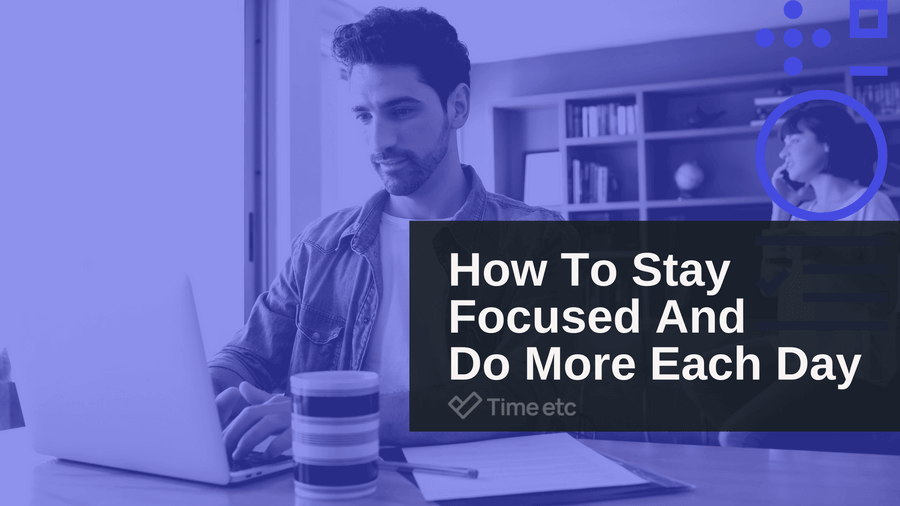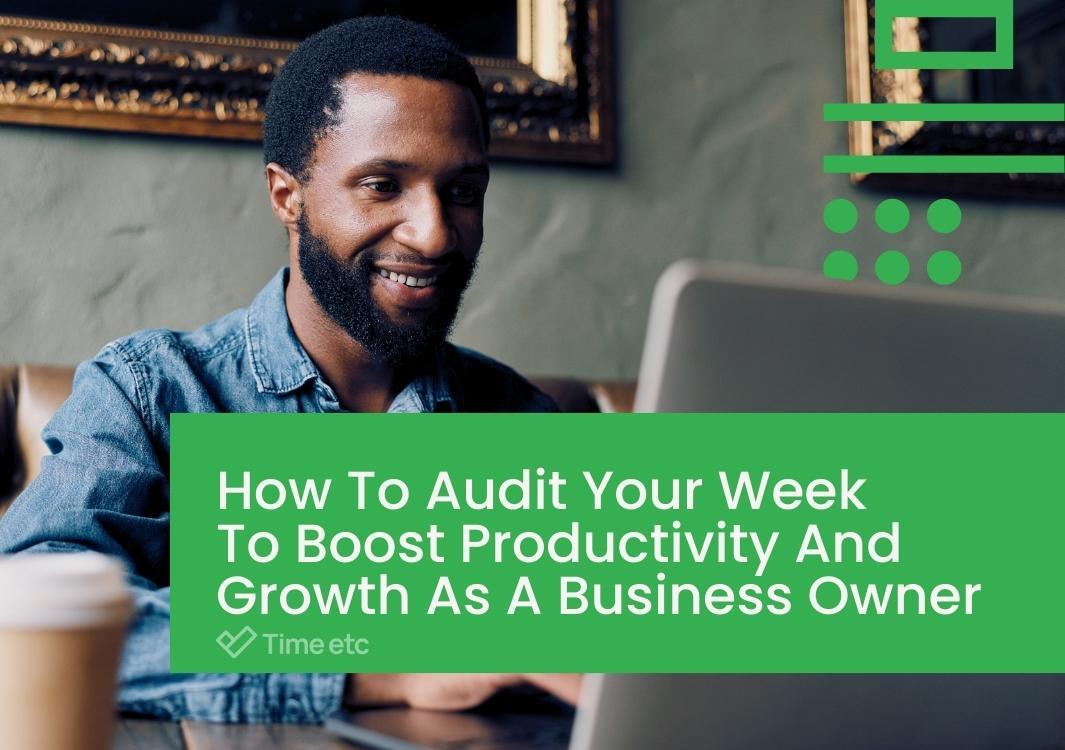We’ve all been there — you need to do one thing but somehow you find yourself doing something else. You may find yourself spending hours on something that should take just a few minutes. So many distractions and demands, so little time.
If you’re struggling to get things done, you’re not alone.
While some experts say that procrastination is human nature, hard-wired into our brains since the dawn of man, the good news is that you don’t have to be a natural-born uber-focused person in order to achieve the most each day.
Focus is a skill that you can build and develop, just like you can build your muscles in the gym.
Whether you want to get your work done on time, spend more time with your family, or achieve all of your goals, here are seven tried-and-tested ways to stay on track and be more productive each day.
1. Set daily goals
Start each day by asking yourself, what do you want to achieve today? While this may sound like a basic piece of advice, answering the question will help to give you a clear purpose that you can center your schedule and workload around.
According to a 2015 study, setting goals is associated with a higher success rate for completion. The researchers divided 267 study participants into five groups, with the fifth group required to prepare a well-defined plan of action and goals. The results showed that this group accomplished more than other groups that didn't follow the strategy.
Another interesting thing about this study is that it also highlighted the importance of accountability, as all participants in the fifth group also had to send their weekly progress reports to a friend.
Whether it’s written down on paper or typed into a productivity app, setting reasonable goals and targets for each day can help you stay focused and aligned on the tasks needed to complete them. Sharing your daily goals with others can also keep you motivated to stay on track.
2. Prioritize tasks
Now ask yourself, what’s your most important task?
Always complete your top-priority task first, even if you do nothing else that day (unlikely as that may be!). That way, if something unexpected comes up, or if you just don’t have the energy to do anything else, you can still feel good about what you accomplished.
It may be tempting to get all your easy tasks out of the way first as ticking items off your to-do list gives you a hit of dopamine, the neurotransmitter responsible for feelings of satisfaction, happiness, and accomplishment. However, this can lead to decision fatigue.
For example, have you ever come home from a tough day at work and found that having to choose what to cook for dinner or what movie to watch seems like an impossible task? That’s decision fatigue at work.
Our supply of mental energy is limited, and the more decisions we make throughout the day, big or small, the more it eats away at our ability to make smart choices, solve problems, think creatively, or stay focused. Tackling the easiest tasks on your to-do lists first uses up your vital mental energy reserves and leaves you with much less for you to focus on your more important tasks later on.
3. Less is more
A full page of tasks can be daunting to look at, so don’t overwhelm yourself with an overly long to-do list.
Not only that, too many options on your to-do list can make it difficult to know where to begin or what to do next, and can lead to choice paralysis, the concept that “the more options we have in front of us, the harder it becomes to choose one.”
The time spent poring over your list trying to decide what to work on next, what would be the best use of your time, and so on, could be time spent on a high-impact task you’d already established in points 1 and 2.
4. Delve into deep work
Let’s be honest, people rarely achieve their goals by bouncing between emails, meetings, and checking notifications all day. This is a sign of busyness, but it’s not the same as productivity.
In his bestselling book Deep Work: Rules for Focused Success in a Distracted World, author and computer science professor Cal Newport wrote that each and every task we do at work falls into one of two categories.
One is “shallow work”, which Newport defines as “non-cognitively demanding, logistical-style tasks, often performed while distracted. These efforts tend to not create new value in the world and are easy to replicate.”
The other is “deep work”, “Professional activity performed in a state of distraction-free concentration that push your cognitive capabilities to their limit. These efforts create new value, improve your skill, and are hard to replicate.”
Realistically, it's highly unlikely you'll be able to eliminate every single "shallow" task from every working day. But for those projects with looming deadlines or those business-critical tasks that will help take your business to the next level, you should regularly block out time in your calendar to work solely on that one thing.
Before you schedule these sessions, begin to establish a structure and decide how long each session will be. You might find shorter sessions work best to begin with, and then you can slowly increase them over time.
Next, choose a workspace that’s as distraction-free as possible, and aim to use this workspace consistently for these sessions if possible. Your brain will start to associate this area with deep work, and you’ll be able to get into the zone much easier.
Finally, set your phone to “Focus” or “Do Not Disturb” mode, put your go-to productivity playlist on, and get ready to do your best work.
5. Rest to reset
When you’re on a deadline or have a tough challenge to solve, it can be tempting to keep working and try to stay focused well beyond your usual limit. But taking breaks is vital for your productivity. “It is, paradoxically, necessary to getting any work done”, says writer Tim Kreiger.
Take a break away from your desk every few hours to clear your head. You might find it’s often easier to focus on a task when it’s new (or at least, when it feels new), so stepping away from the task can help refresh your mind and give you a fresh perspective when you return.
Studies have also found that we are able to generate new ideas and solve problems more creatively when our minds are allowed to wander, and breaks give us the opportunity to do just that.
Depending on who you ask, the answer to the ideal frequency of your breaks varies quite significantly. Based on studies into ultradian rhythms, some say that we should be taking breaks every 90 minutes. However, the Pomodoro Technique advocates for short breaks every 25 minutes, and according to research by the Draugiem Group, 17-minute breaks every 52 minutes are best.
It's important to remember that while non-stop work may help you get done more temporarily, it's not a viable approach in the long term. Instead, giving yourself the rest you need will make sure you’re always on top form for doing your best work.
6. Remove distractions early
While regular breaks are crucial for maintaining productivity, unintentional distractions can seriously derail your focus. How often do you find yourself working on a task, only to get sidetracked by notifications pinging, your phone ringing, or even your stomach rumbling?
Before you settle in to try and do some deep work (or any work for that matter!), make sure you have everything you need. Arm yourself with drinks and snacks ready, and clear any clutter from your workspace.
Why? Believe it or not, a messy desk can make it harder to focus. A recent study by Princeton Neuroscience Institute found that having a lot of visual stimuli present when trying to concentrate results in those visual items competing for your attention. In other words, if there is too much else going on in your view, you will need to concentrate harder to get a task done.
When it comes to preparing yourself for work and removing distractions, it’s important to do this as early as possible, as it can be a slippery slope that leads to procrastination.
For example, you’re in the middle of a task, then you decide you’ll throw that piece of trash away that’s been niggling at you all morning. Once you arrive in the kitchen, you decide you want a hot drink. While you’re waiting for your coffee, you check your social media feeds. There, you might watch a series of videos, start a conversation with a friend, or follow an ad to do some online shopping.
What starts as a harmless chore can lead to the loss of a significant chunk of time. A 2008 study into the effects of interruptions at work found that it takes an average of 23 minutes and 15 seconds to get back to the task after being distracted. Research leader Gloria Mark says “You have to completely shift your thinking, it takes you a while to get into it and it takes you a while to get back and remember where you were.”
7. Learn to say no
As the head of your business, there will always be someone or something that wants your attention.
If you’re not careful, you could find yourself doing or agreeing to things you shouldn’t be doing yourself, for the simple reason that they’re easier than the more important work you really should be doing, and ticking them off your list is an easy dopamine hit. It might not seem like a big deal to stop what you're doing and help out, but the time it takes out of your day can quickly add up.
So, you must set firm boundaries around your time to make each second in work as impactful and productive as possible. In the words of entrepreneur and author Peter Voogd, “The more you protect your time, the more valuable it becomes.” It can be difficult, especially if you're a people-pleaser, but you’ll struggle to grow your business or achieve your goals without it.
What’s the bottom line?
As an entrepreneur with so many things on your plate, it's all too easy to get distracted, overwhelmed, and feel like you’re fighting a losing battle against your workload.
But living a more focused and productive life starts with learning what you need to focus on, and what you need to let go of. Some key steps you can take include minimizing interruptions, keeping your mind fresh with regular breaks, and setting boundaries around your time and energy.







